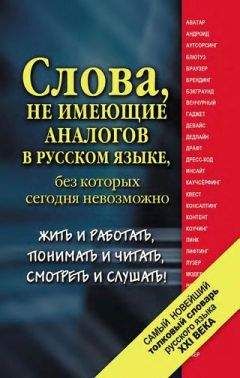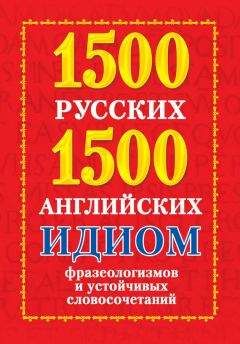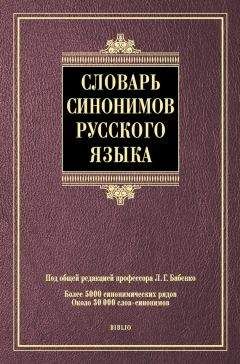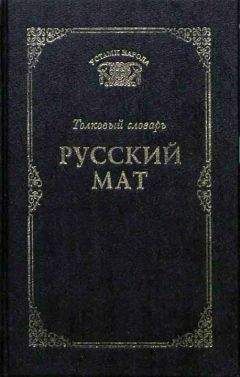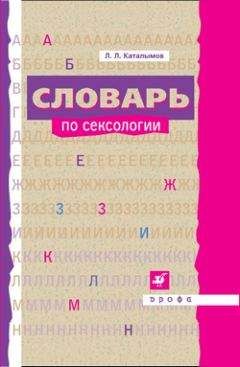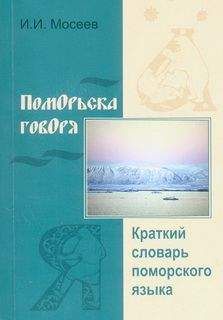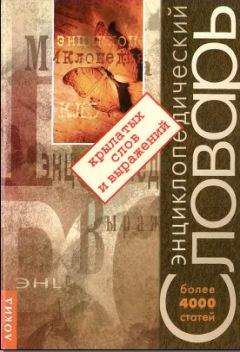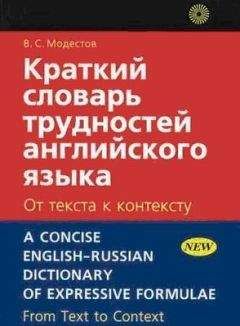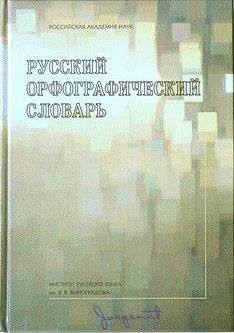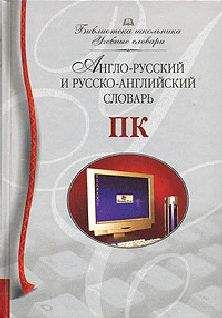Adam Makkai - Словарь американских идиом: 8000 единиц
Скачивание начинается... Если скачивание не началось автоматически, пожалуйста нажмите на эту ссылку.
Жалоба
Напишите нам, и мы в срочном порядке примем меры.
Описание книги "Словарь американских идиом: 8000 единиц"
Описание и краткое содержание "Словарь американских идиом: 8000 единиц" читать бесплатно онлайн.
Это обновленное и дополненное издание, содержащее более 8000 идиоматических слов и выражений, причем каждое из которых снабжено грамматическим объяснением и практическим примером. Словарь содержит лексемные идиомы, фразеологические единицы и поговорки, имеющие особенное значение. В нем приведены наиболее употребительные выражения только американского английского языка. Этот словарь — идеальное пособие для студентов, часто разъезжающих бизнесменов и просто путешественников.
[second nature]{n.} Something done without any special effort, as if by natural instinct. •/Cutting tall trees has become second nature to the experienced lumberjack./
[second-rate]{adj.} Of mediocre or inferior quality. •/The movie received a bad review; it was second-rate at best./
[second-run]{adj.} Of a movie: Shown in many movie theaters before, and allowed to be shown later in other movie theaters. •/Tickets to second-run movies cost much less./
[second sight]{n. phr.} Intuition; prescience; clairvoyance. •/Some police departments employ psychics to find missing persons or objects as they are said to have second sight./
[second thought]{n.} A change of ideas or opinions resulting from more thought or study. •/Your second thoughts are very often wiser than your first ideas./ •/We decided to climb the mountain, but on second thought realized that it was too dangerous./ Compare: THINK BETTER OF.
[second to none]{adj. phr.} Excellent; first rate; peerless. •/Our new State University campus is second to none. There is no need to pay all that high tuition at a private college./
[second wind] also [second breath] {n.} 1. The easier breathing that follows difficult breathing when one makes a severe physical effort, as in running or swimming./ •/After the first quarter mile, a mile runner usually gets his second wind and can breathe better./ •/We climbed with labored breathing for half an hour, but then got our second wind and went up more easily./ 2. {informal} The refreshed feeling you get after first becoming tired while doing something and then becoming used to it. •/Tom became very tired of working at his algebra, but after a while he got his second wind and began to enjoy it./
[secret] See: IN SECRET, OPEN SECRET.
[section gang] or [section crew] {n.} A group of railroad workers who watch and repair a number of miles of track. •/The section crew was called out to fix the broken bridge./
[section hand]{n.} A worker who repairs railway track; one of the men in a section gang. •/The section hands moved off the track while the train went by./
[security blanket]{n.}, {slang}, {colloquial} An idea, person, or object that one holds on to for psychological reassurance or comfort as infants usually hang on to the edge of a pillow, a towel, or a blanket. •/Sue has gone to Aunt Mathilda for a chat; she is her security blanket./
[see] See: CAN’T SEE THE WOODS FOR THE TREES, LET ME SEE or LET’S SEE.
[see a lot of]{v. phr.} To go out regularly with someone; have an affair with someone. •/They have been seeing a lot of each other lately./
[see about]{v.} 1. To find out about; attend to. •/If you are too busy, I’ll see about the train tickets./ 2. {informal} To consider; study. •/I cannot take time now but I’ll see about your plan when I have time./ Compare: SEE TO, LOOK INTO, THINK OVER.
[see after] See: LOOK AFTER.
[see better days]{v. phr.} 1. To enjoy a better or happier life. •/Mr. Smith is poor now, but he will see better days./ 2. To become old, damaged, or useless. Used in the perfect tense. •/Mv blue coat is ten years old. It has seen better days./ •/Our car wasn’t old, but it had seen better days./
[see beyond one’s nose] or [see beyond the end of one’s nose] {v. phr.} To make wise judgments about questions of importance to yourself and others; act with farseeing understanding. Used in negative, conditional, and interrogative sentences. •/He couldn’t save money or make plans for the future; he just never saw beyond the end of his nose./ •/People who always complain about school taxes would stop it if they could see beyond their noses and understand the importance of first-class schools./
[seed] See: GO TO SEED or RUN TO SEED.
[see daylight]{v. phr.}, {informal} To know that an end or success is near. •/We thought we would never finish building the house, but now we can see daylight./ •/Sarah thought it would take forever to read the book for her report, but finally she saw daylight./
[see eye to eye]{v. phr.} To agree fully; hold exactly the same opinion. •/Though we did not usually agree, we saw eye to eye in the matter of reducing taxes./ •/Jim did not see eye to eye with Sally on where they would go for their vacation./
[see fit] or [think fit] {v. phr.} To decide that an action is necessary, wise, or advisable; choose. •/Jim asked "Dad, what time should I come home after the dance?" His father answered, "You way do as you see fit."/ — Often used with an infinitive. •/After much thought, we did not see fit to join the Smiths on their Caribbean cruise./ •/The boys were angry because Ed thought fit to report the fight to the principal./
[see how the land lies]{v. phr.}, {informal} To reconnoiter; investigate. •/Before going there in person to ask for a job, you had better see how the land lies and who does what./ Compare: CASE THE JOINT.
[seeing is believing] Seeing something is good proof. •/Bill told Joe he had passed his test, but Joe said, "Seeing is believing."/
[see into]{v.} To know or understand the real nature or meaning of. •/Suddenly the teacher saw into Linda’s strange actions./
[see off]{v.} To go to say or wave goodbye to. •/His brother went to the train with him to see him off./ •/When Marsha flew to Paris, Flo saw her off at the airport./
[see one home]{v. phr.} To walk a person home. •/"Let me see you home, dear," Nick said to Jenny at the end of the party./
[see one’s way clear]{v. phr.} To know no reason for not doing something; feel that you are free. •/John finally saw his way clear to help his friends./ •/Mary had to do her homework and help her mother before she could see her way clear to go to the movies with Jane./
[see out]{v.} 1. To go with to an outer door. •/A polite man sees his company out after a party./ 2. To stay with and finish; not quit. •/Pete’s assignment was hard but he saw it out to the end./
[see reason]{v. phr.} To think or act sensibly, especially after realizing what the facts are on a certain matter and accepting advice about it. •/He finally saw reason and reshaped his sales strategy by lowering the prices as his older brother had suggested./
[see red]{v. phr.}, {informal} To become very angry. •/Whenever anyone teased John about his weight, he saw red. /
[see service]{v. phr.} 1. To be used over a considerable period of time. •/This old camera of mine has already seen six years of service./ 2. To serve in a military sense. •/Colonel Hutchins has seen service in World War II, Korea, Vietnam, and the Persian Gulf./
[see stars]{v. phr.}, {informal} To imagine you are seeing stars as a result of being hit on the head. •/When Ted was hit on the head by the ball, he saw stars./ •/The boxer’s head hit the floor, making him see stars./
[see the beat] See: HEAR THE BEAT.
[see the color of one’s money]{v. phr.}, {informal} To know that you have money to spend. •/The realtor would not show us a house until he saw the color of our money./ •/Before I show you the diamond, let me see the color of your money./
[see the last of]{v. phr.} To say good-bye to someone or something; get rid of something. •/We were glad to see the last of the winter./
[see the light]{v. phr.}, {informal} To understand or agree, often suddenly; accept another’s explanation or decision. •/I did not approve of his action, but he explained his reason and then I saw the light./ •/Bill wanted Harry to help him, but Harry wasn’t in the mood until Bill offered to pay him. Then Harry saw the light./ •/Mary thought it was fun to date older boys but when they started drinking, she saw the light./
[see the light at the end of the tunnel]{v. phr.}, {informal} To anticipate the happy resolution of a prolonged period of problems. •/We’ve been paying on our house mortgage for many years, but at long last we can see the light at the end of the tunnel./
[see the light of day]{v. phr.} To be born or begun. •/The children visited the old house where their great-grandfather first saw the light of day./ •/The party was a failure, and Mathilda wished her plan had never seen the light of day./
[see the sights] See: SIGHTSEE.
[see things]{v. phr.}, {informal} To imagine sights which are not real; think you see what is not there. •/I had not seen him for twenty years and when we met on the street I thought I was seeing things./ •/She woke her husband to tell him she had seen a face at the window, but he told her she was seeing things./
[see through]{v.} 1. To understand the real meaning of or reason for; realize the falseness of. •/Mother saw through Johnny’s excuses not to go to bed on Christmas Eve. She knew he wanted to stay up to see Santa Claus./ •/The teacher saw through the boy’s story of having to help at home./ 2. To do (something) until finished; stay with until the end. •/Once Charles started a job, he saw it through till it was finished./ 3. To help and encourage (a person) through trouble or difficulty. •/Mrs. Miller saw Jane through her sickness./ •/When Mr. and Mrs. Brown lost their little girl, their friends saw them through with help and sympathy./ •/His business was about to fail, but his banker saw him through./ 4. To be enough for; last. •/This money will see us through the week./ •/Here is a long report to type. Do you have enough paper to see you through?/ Compare: TIDE OVER.
[see to] also [look to] {v.} To attend to; take care of; do whatever needs to be done about. •/While Donna bought the theatre tickets, I saw to the parking of the car./ Compare: SEE ABOUT.
[see to it]{v. phr.} To take care; take the responsibility; make sure. — Usually used with a noun clause. •/We saw to it that the child was fed and bathed./
[see with rose-colored glasses] See: LOOK AT THE WORLD THROUGH ROSE-COLORED GLASSES.
[seed money]{n. phr.} A small grant or donation for others to be able to start a new venture. •/All you need is some seed money and you can set up your own desk-top publishing firm./
[seize on]{v.} To make use of (a happening or idea.) •/Bob seized on the rain as an excuse for missing school./
[seize on] or [upon] {v. phr.} To latch onto. •/Whenever Herb is in a romantic mood, Irene seizes on it and starts talking about marriage, which is not what Herb had in mind./
[seize the opportunity]{v. phr.} To exploit a chance. •/His wealthy uncle offered to send him to Harvard and he wisely seized the opportunity./
[self-conscious]{adj.} Embarrassed; shy. •/Edith has a freckled face and sometimes she is very self-conscious about it./
[self-made]{adj.} Having achieved wealth, fame, and success on one’s own without outside help. •/John D. Rockefeller is one of the most famous self-made men in America./
[self-possessed]{adj.} Confident; sure of one self. •/Before he made his first million, he used to be shy, but afterwards he became very self-possessed./
[self-seeking]{adj.} Given to egotism and self-aggrandizement. •/Al is the most self-seeking person I’ve ever met, he is not fun to be around./
[sell down the river]{v. phr.} To give harmful information about someone or something to one’s enemies; betray. •/The traitor sold his country down the river to the enemy army./ •/The criminal told the hiding place of his companions and sold them down the river./ Compare: SELL OUT(2).
[sell off]{v. phr.} To liquidate one’s holdings of certain set items. •/The retired professor had to sell off his rare butterfly collection to meet his health expenses./
Подписывайтесь на наши страницы в социальных сетях.
Будьте в курсе последних книжных новинок, комментируйте, обсуждайте. Мы ждём Вас!
Похожие книги на "Словарь американских идиом: 8000 единиц"
Книги похожие на "Словарь американских идиом: 8000 единиц" читать онлайн или скачать бесплатно полные версии.
Мы рекомендуем Вам зарегистрироваться либо войти на сайт под своим именем.
Отзывы о "Adam Makkai - Словарь американских идиом: 8000 единиц"
Отзывы читателей о книге "Словарь американских идиом: 8000 единиц", комментарии и мнения людей о произведении.





